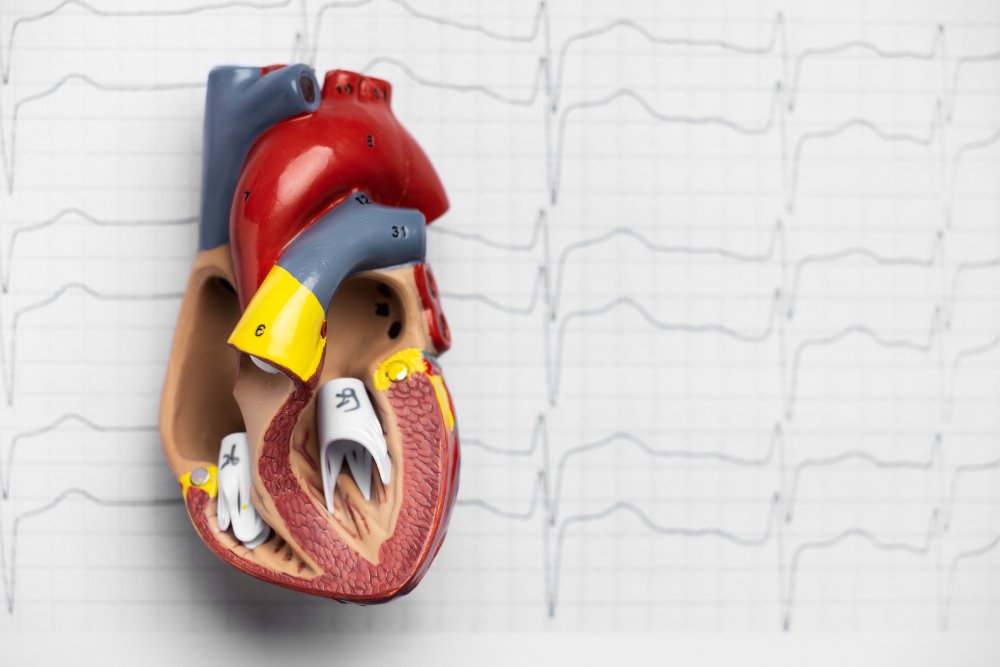Valvular heart disease is a condition affecting the heart’s valves, which are essential for maintaining proper blood flow through the heart chambers and to the rest of the body. When the heart valves are damaged or diseased, they may not open or close properly, disrupting the normal flow of blood. This can lead to various complications, including heart failure, stroke, and other cardiovascular issues.
The Role of Heart Valves
The human heart has four valves—mitral, aortic, tricuspid, and pulmonary—that regulate blood flow. These valves act as gates, ensuring blood flows in one direction and preventing backflow. Valvular heart disease typically involves one or more of the following issues:
- Stenosis: A narrowing of the valve, restricting blood flow.
- Regurgitation: The valve does not close properly, causing blood to leak backward.
- Prolapse: The valve flaps bulge into the heart chamber, disrupting function.
Causes of Valvular Heart Disease
Several factors can lead to valvular heart disease, including:
- Congenital Defects: Some individuals are born with abnormal heart valves.
- Rheumatic Fever: A complication of untreated strep throat that can damage valves.
- Aging: Degenerative changes in the valves due to wear and tear over time.
- Endocarditis: Infection of the inner lining of the heart, including the valves.
- Heart Attack: Damage to the heart muscle can impair valve function.
Symptoms to Watch For
The symptoms of valvular heart disease can vary depending on the severity and type of valve issue. Common signs include:
- Shortness of breath, especially during activity or lying flat.
- Fatigue and weakness.
- Chest pain or discomfort.
- Swelling in the ankles, feet, or abdomen.
- Heart palpitations or irregular heartbeat.
- Fainting or dizziness.
If you experience these symptoms, it’s crucial to seek evaluation at a reputable healthcare facility, such as heart bypass surgery hospitals in lakhanpur, which are equipped to diagnose and treat complex cardiac conditions.
Diagnosis
To diagnose valvular heart disease, doctors use a combination of methods:
- Physical Exam: Listening for abnormal heart sounds, like murmurs.
- Echocardiogram: An ultrasound of the heart to visualize valve function.
- Electrocardiogram (ECG): Measuring the electrical activity of the heart.
- Cardiac MRI: Providing detailed images of the heart and valves.
- Cardiac Catheterization: Measuring pressure in the heart chambers and arteries.
Treatment Options
The treatment for valvular heart disease depends on the severity of the condition and the specific valve affected. Options include:
- Medications: Used to manage symptoms and prevent complications. These include blood thinners, diuretics, and medications for blood pressure and heart rhythm.
- Non-Surgical Interventions: Minimally invasive procedures like balloon valvuloplasty to widen a narrowed valve or transcatheter valve replacement for certain cases.
- Surgery:
- Valve Repair: Preserving the patient’s natural valve.
- Valve Replacement: Using a mechanical or biological prosthetic valve.
Leading heart bypass surgery hospitals in lakhanpur offer advanced surgical techniques for valve repair and replacement, ensuring optimal outcomes for patients.
Prevention and Lifestyle
While not all cases of valvular heart disease are preventable, adopting a heart-healthy lifestyle can reduce the risk:
- Maintain a balanced diet low in saturated fats and high in fruits, vegetables, and whole grains.
- Exercise regularly to keep the heart strong.
- Avoid smoking and limit alcohol consumption.
- Manage chronic conditions like hypertension and diabetes.
Why Choose Heart Bypass Surgery Hospitals?
Hospitals specializing in cardiac care, like heart bypass surgery hospitals in lakhanpur, are equipped with state-of-the-art technology and experienced cardiologists. They provide comprehensive care, from accurate diagnostics to advanced surgical treatments, ensuring the best possible outcomes for patients with valvular heart disease and other cardiac conditions.
Conclusion
Valvular heart disease is a serious condition that requires timely diagnosis and management to prevent complications. By understanding the symptoms and seeking care from trusted institutions, such as heart bypass surgery hospitals in lakhanpur, patients can access cutting-edge treatments and improve their quality of life. Taking proactive steps to maintain heart health can make all the difference in preventing or managing this condition.


